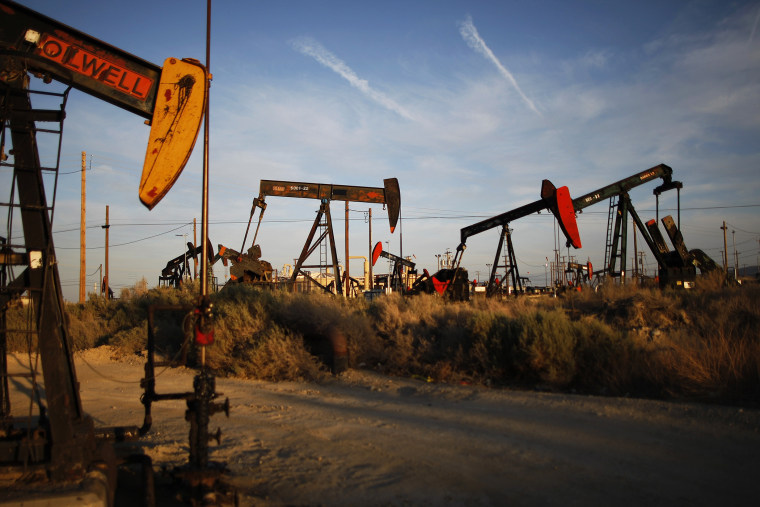Fracking is quickly emerging as an under-the-radar issue likely to influence the Democratic presidential primary in 2016, inflaming passionate opposition among the party's base.
The use of hydraulic fracturing to extract oil and gas has created thousands of new jobs and drastically increased domestic energy production, but it has also raised major environmental and health concerns.
Not unlike the issue of Common Core educational standards among conservatives, fracking touches a nerve with rank-and-file progressives, especially in rural areas, even as it gets less attention from cosmopolitan Democrats, who will likely never encounter a fracking well in their backyard.
Anti-fracking activists on the left have been disappointed by the Obama White House’s acquiescence to the technique -- it’s hard for any president to turn down jobs during a recession -- and are pressuring those who might be the Democratic Party’s next presidential nominee to draw a harder line.
Activists have already knocked former Secretary of State Hillary Clinton and are turning their sights on other potential candidates.
New York and Maryland are the only two states with shale formations that haven’t yet allowed drilling. As it happens, both states have popular Democratic governors with major national ambitions.
In New York, Gov. Andrew Cuomo has said that anti-fracking activists are by far the visible pressure group in the state. “I literally see them everywhere I go,” he told Capital New York. “One of my daughters joked -- we were pulling up to an event -- she said, ‘We must be in the wrong place. There are no fracking protesters.’”
Last year, anti-fracking activists ran a full-page ad in The Des Moines Register -- far from Albany, but close to the Iowa Caucuses -- warning Cuomo: "Not one well."
And the pressure is now on Maryland Gov. Martin O’Malley. In a letter sent to him Thursday, a coalition of more than 200 environmental, progressive and health groups fired a warning shot across the bow of the nascent O'Malley presidential effort.
If he runs for president —and it’s looking increasingly like he will – the governor will want to be the consensus progressive alternative to Clinton. With progressive icon Sen. Elizabeth Warren unlikely to enter the race, O'Malley has a good shot at carrying that mantle, though he may have to compete with others like Vermont Sen. Bernie Sanders.
O'Malley has been working hard to lay the groundwork for a campaign, and he has positioned himself to the left of Clinton on everything from immigration to campaign finance.
Fracking would be another obvious place for him to draw a contrast with the former secretary of state, who has said she will announce her 2016 plans early next year. If O'Malley doesn’t do that, however, some activists are warning he could risk his position as a leading liberal alternative.
"If Gov. O'Malley is serious about making a play for progressive 'Warren-wing' Democratic voters in the 2016 presidential primary, he should know better than to do Wall Street's bidding and put the health of millions at risk by allowing fracking to come to Maryland on his watch," said Jim Dean, the chair of Democracy for America, a national organization that grew out of Howard Dean’s 2004 presidential campaign.
More than three years ago, O’Malley effectively imposed a moratorium on fracking in Maryland until the completion of a study he commissioned. With the study process wrapping up soon, the anti-fracking activists who sent the letter Thursday want O’Malley to take a stand against the practice, both for the remainder of his final term and to influence the next governor of his state.
And they worry privately that if the more progressive O’Malley approves drilling in Maryland, it will give political license for Cuomo to do the same in New York.
"In 2016, Democrats are looking to nominate a presidential candidate who will stand up and fight growing income inequality, not cave to the special interest forces on Wall Street who advocate for fracking at any cost," added Dean, whose group has 20,000 members in Maryland.
While the letter focused exclusively on the potential health and environmental risks fracking may pose to Maryland residents, some of the groups involved -- like Dean's -- used the release as a means to remind O’Malley of the potential risk to his personal ambitions as well.
Wenonah Hauter, executive director of Food & Water Watch, another member of the coalition, also hinted at 2016. “Gov. O’Malley is traveling extensively throughout the country to places like Iowa, Nevada, and New Hampshire in an effort to raise his national profile and tout his environmental record, but the national movement against fracking is watching what is happening in Maryland closely,” Hauter said. “Should Gov. O’Malley open the state to fracking, that is what people will remember about him.”
Currently, fracking is regulated on the state level, but many environmentalists and progressives want federal regulation or even an outright ban on the practice. A majority of Democrats (59%) opposed fracking, according to a Pew poll from last September, and the opposition is even higher among liberals (64%).
At the same time, there are many in the party who view fracking as a boon to the economy and U.S. energy independence. And natural gas is much cleaner than other fossil fuels, so many environmentalist view the fuel as an ideal “bridge” to a future when renewable energy is more practical.
That’s the balance Democrats hoping to win their party’s nomination in 2016 will have to make.
